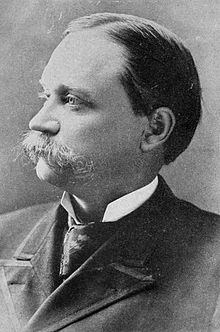Clifton R. Breckinridge
Clifton Rodes Breckinridge (born November 22, 1846 in Lexington , Kentucky , † December 3, 1932 in Wendover , Kentucky) was an American politician . Between 1883 and 1894 he represented the state of Arkansas in the US House of Representatives .
origin
Clifton Breckinridge came from a well-known family of politicians. His father, John C. Breckinridge, was Vice President of the United States under President James Buchanan from 1857 to 1861 , and his mother was Mary Cyrene Burch Breckinridge . In 1861 he was a US Senator for a short time and then General and in 1865 Minister of War of the Confederate States . Clifton Breckinridge's great-grandfather, John Breckinridge, was also a US Senator and Attorney General of the United States from 1805 to 1806 .
Early years and political advancement
Clifton Breckinridge attended rural schools in his home in Kentucky. During the Civil War he was first in the Army and then in the Navy of the Confederate States. After the end of the war, he studied for three years at Washington College , now Washington and Lee University . In 1870 he moved to Pine Bluff , Arkansas, where he ran a cotton plantation with his older brother and worked as a commission dealer for 13 years.
As a member of the Democratic Party , Breckinridge became a member of Pine Bluff Parish Council. In 1882 he ran for the newly created fifth seat of the state of Arkansas in the US House of Representatives. These elections were held across the state of Arkansas at the time. After winning the election, Breckinridge could exercise this mandate between March 4, 1883 and March 3, 1885. He became a member of the Committee on Ways and Means . In the elections of 1884 and 1886 he was re-elected to the House of Representatives for the second district of Arkansas. He was thus able to complete two more undisputed legislative periods in Congress between March 4, 1885 and March 3, 1889 .
Controversial elections
In the 1888 congressional elections, there were irregularities in the second district of Arkansas. The candidates were Clifton Breckinridge, who ran for re-election, and Republican John M. Clayton , brother of the governor and US Senator Powell Clayton . In Conway County , masked white men broke into a polling station in a Republican stronghold and stole the ballot box. After Breckinridge was declared the election winner, Clayton filed a complaint against the election results about the incident. In the meantime, Breckinridge exercised the controversial mandate in Congress between March 4, 1889 and September 5, 1890. Clayton's complaint was then granted. However, he had already been murdered by unknown perpetrators on January 29, 1889 and was therefore unable to take his seat in Congress. The seat was declared vacant and by-elections were announced. In the meantime there has been an investigation into the incidents, whereby Breckinridge could not be proven to be involved in these events. He won the by-elections and was able to take his old seat in Congress on November 4, 1890.
Further political career
In the following two regular congressional elections in 1890 and 1892, Breckinridge was confirmed. In 1894 he was no longer nominated because he had campaigned for the gold standard of the currency against the will of his supporters. He remained in Congress until August 14, 1894. Then he resigned, although the term would have run until March 3, 1895, because he had been appointed Ambassador of the United States to Russia by President Grover Cleveland . Between 1894 and 1897 Breckinridge represented the USA at the Tsar's court in Saint Petersburg . There he experienced the coronation of Tsar Nicholas II of Russia. Breckinridge returned to Pine Bluff in 1897 and returned to his private affairs. In 1900 President William McKinley appointed him to the Dawes Commission, which was supposed to take care of financial donations for five Indian tribes. He remained in the commission until 1905, which in the meantime came under suspicion of corruption, but was ultimately acquitted after an investigation.
Old age and death
After serving on the Dawes Commission, Breckinridge founded the Arkansas Valley Trust Company in Fort Smith , of which he was president until 1914. In 1917 and 1918 he was a delegate to a conference to revise the Arkansas state constitution. He stayed in Fort Smith until 1925, when he moved to Kentucky to live with his daughter. He died in December 1932 and was buried in Lexington. Clifton Breckinridge was married to Katherine Carson, who died in 1921, since 1876, with whom he had four children.
Web links
- Clifton R. Breckinridge in the Biographical Directory of the United States Congress (English)
- Clifton R. Breckinridge in the database of Find a Grave (English)
| personal data | |
|---|---|
| SURNAME | Breckinridge, Clifton R. |
| ALTERNATIVE NAMES | Breckinridge, Clifton Rodes (full name) |
| BRIEF DESCRIPTION | American politician |
| DATE OF BIRTH | November 22, 1846 |
| PLACE OF BIRTH | Lexington , Kentucky |
| DATE OF DEATH | December 3, 1932 |
| Place of death | Wendover , Kentucky |

